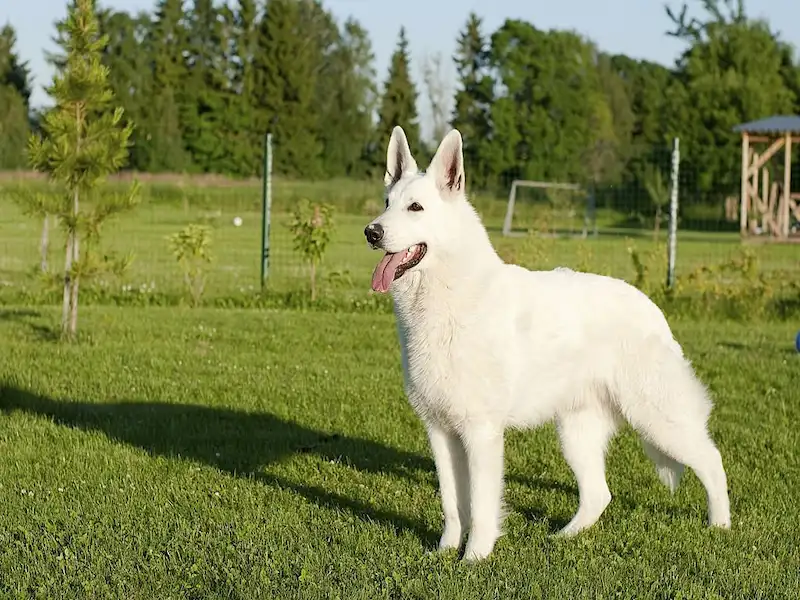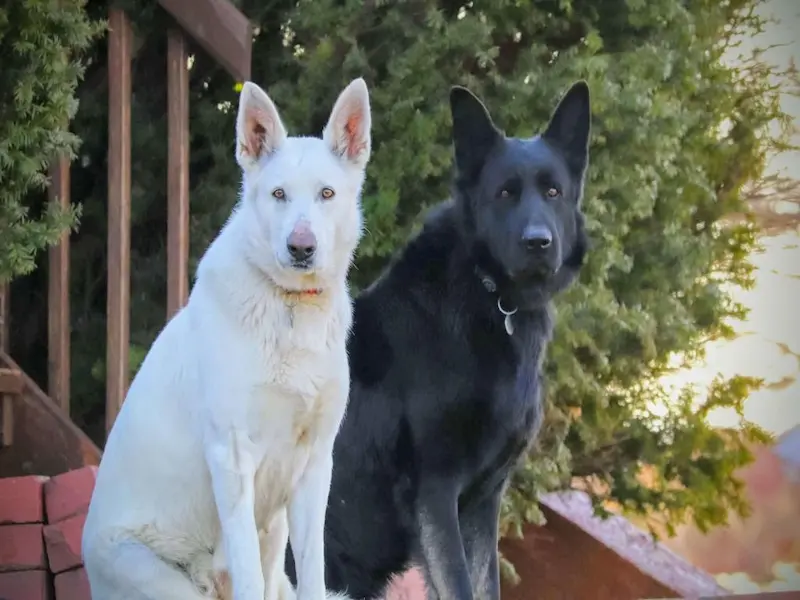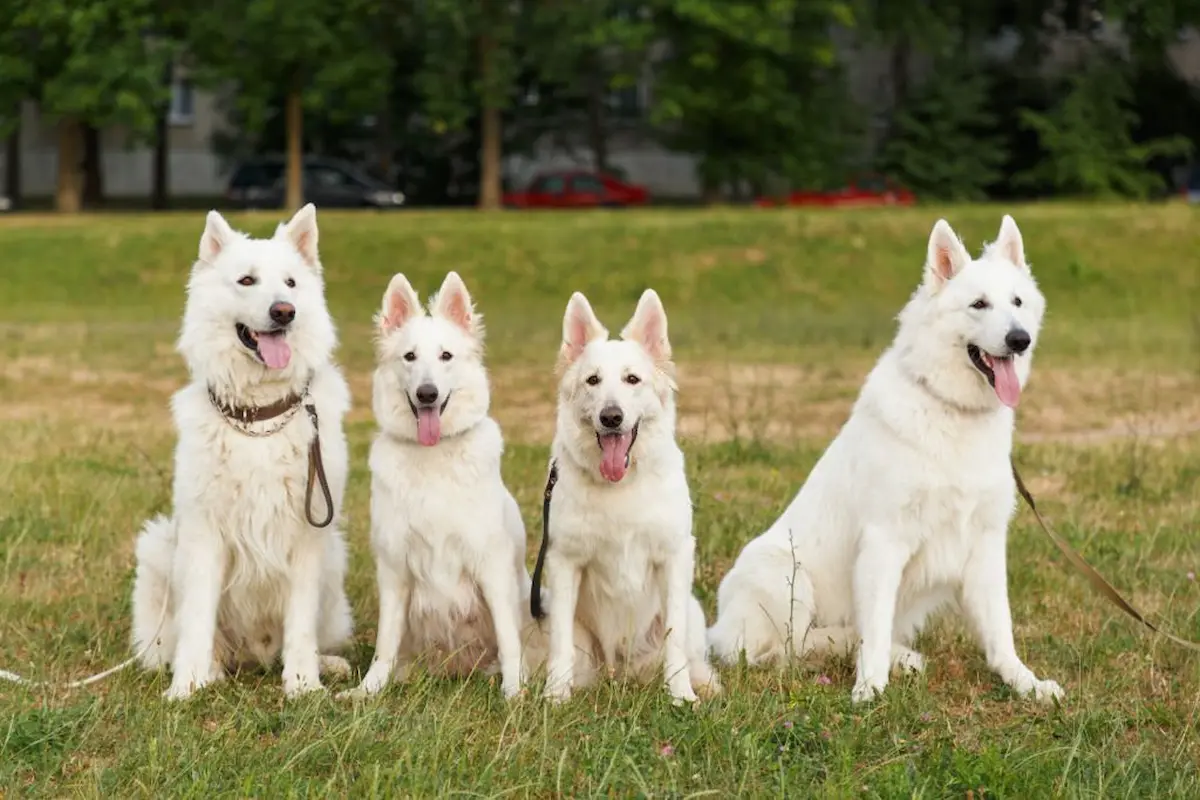The White German Shepherd is the same breed of dog as a regular German Shepherd, with the only difference being that White German Shepherds have a double recessive white gene that causes their coat to be all white.

All other aspects of the dog are genetically identical to the German Shepherd. Although otherwise genetically identical, the White German Shepherd does not meet the current German Shepherd breed standard.
Like all German Shepherds, the White German Shepherd is a loyal, loyal, and fearless dog that makes an excellent family pet and house guardian, but can also be excellent as a working dog.
RELATED: 12 Dog Breeds That Only Have White Coats
Before You Buy…White German Shepherd Puppies
Naturally occurring White German Shepherds are fairly rare; To produce a white puppy, both parent dogs must carry and pass on the recessive white gene. Therefore, it is common for White German Shepherds to have siblings in their litter that are not white. In fact, the only way to guarantee a litter of white puppies is to breed from two white dogs.
As such, a White German Shepherd puppy is significantly more difficult to find and purchase than a regular color puppy. From a practical point of view, you should expect that those looking to buy a White German Shepherd will have to wait longer for a puppy to become available and you may also have to pay more than for a regular German Shepherd puppy.
What is the price for white German shepherd puppies?
White German Shepherds are quite rare and can sometimes be more expensive than regular-colored dogs. Therefore, you should expect to pay anywhere from $750 to $2,000 for a puppy.
RELATED: what are the top 10 most expensive dog breeds?
3 Little Known Facts About the White German Shepherd Dog
1. A White German Shepherd White is not a German Shepherd albino
It’s a common misconception that White German Shepherds are albinos. However, this is not the case. As with Black German Shepherds, their coloration is the result of carrying two recessive genes.
Animals that are albinos have deficient pigmentation, causing them to have pale skin, pink eyes, and colorless hair. The White German Shepherd has either pink or black skin, a black nose, and normal brown or gold eyes.
2. Both the black and white German Shepherds are the result of recessive coat color genes, but the white gene affects the color of the dogs differently
Unlike the recessive black coat color gene, which gives the black German Shepherd a true black color, the recessive white color gene is not a true white gene but serves to mask the true color of the dog’s coat, leaving it pure white.
3. The White German Shepherd does not have any additional health problems
Contrary to popular belief, White German Shepherds do not have any additional health problems. They are typically just as healthy as any other German Shepherd and are prone to the same health issues as any other German Shepherd.
RELATED: 10 facts about the dog breed Rhodesian Ridgeback
Temperament & Intelligence of the White German Shepherd Dog
White German Shepherds are the same dog as the German Shepherd and share all of the personality traits of their colored cousins.
German shepherds are extremely intelligent dogs and can be trained particularly well. They are also a loyal and protective breed, fearlessly defending their home and family members from any perceived threat.
While German Shepherds are consistently one of the most popular dog breeds, they are not for everyone. They need lots of attention and exercise and a firm and consistent workout. Being large, strong dogs, they also need a confident and strong-willed owner who can maintain a consistent approach and keep their dog engaged.
Are these dogs suitable for families?

German Shepherds, and therefore White German Shepherds, can make excellent family pets, but they are large, strong dogs that need to be guided firmly. Despite their size and intimidating nature, they can be cuddly and love nothing more than running around the garden, playing with children, and taking care of them.
Like all German Shepherds, White German Shepherds can be protective and act aggressively toward strangers they see as a threat. This aspect can be kept in check with proper socialization and training. However, thanks to their white coat, they can appear friendlier than other German Shepherds, and people who are normally wary of a German Shepherd may feel more comfortable approaching a white dog. While this can be positive, it can be problematic if the dog tends to be aggressive toward strangers.
RELATED: How Much Does a Border Collie Dog Cost? (2022 Price Guide)
Does this breed get along well with other pets?
Like all German Shepherds, White German Shepherds do well with other large breed dogs. However, if they do not spend time with and around other pets as a child, they may not accept other pets, although this problem can be overcome with commitment and training. However, this must be handled carefully, as these dogs can easily injure or kill other small animals if they react aggressively.
Things to know if you own a white German Shepherd dog
Food and nutritional requirements
Regardless of their color, German Shepherds thrive best when fed high-quality dry foods specially designed for large breed dogs. There are several brands of food available online and in pet food stores; the ideal would be to buy a product with a high content of meat proteins and formulated for a complete and balanced diet.
It is also a good idea to find a food brand that has a range of formulas for dogs in their different life stages. This ensures that the dog gets the best nutrition from a young puppy to an older or senior dog.
Exercise
All German Shepherds, including White German Shepherds, are bred as working dogs and therefore need to get adequate daily exercise. The ideal would be to do at least an hour of outdoor activities and go for a nice walk or run every day.
Working dogs are likely to receive adequate daily physical activity and mental stimulation and don’t need the same amount of play and exercise as those who spend their days as pets. However, working dogs will also enjoy a long walk or play session every day or two.
Training

German Shepherds have a well-deserved reputation for being dogs that can be trained to an exceptionally high standard, and this also applies to White German Shepherds.
In fact, training is essential for these large dogs and one should begin their training program by enrolling them in puppy school when they are still very young. Puppy school, unlike formal obedience training, does not involve structured training, but focuses on socializing and getting the new puppy used to being around people and other dogs.
Like all dogs, White German Shepherds respond best to positive reinforcement and appreciate the training that includes play and/or food rewards.
Once your dog has mastered the basics, you may find that your White German Shepherd likes something more challenging, such as agility training and dog sports. This type of advanced training can be enjoyable for both the dog and the owner and is a great way to get the dog out to exercise and stimulate the mind.
Grooming
Like all other German Shepherds, the White German Shepherd is available in both long-haired and short-haired, and as can be expected, long-haired dogs require more frequent grooming than short-haired ones.
Regardless of whether you have a long-haired or short-haired dog, your White German Shepherd will have a thick, double coat, which they will shed throughout the year. For most of the year, the dog will need to be brushed once or twice a week. However, twice a year they “blow” their undercoat and in this case, it is likely that they need to be brushed daily.
Whether you have a long-haired or short-haired dog, your White German Shepherd will have a thick, double coat that they will shed throughout the year. For most of the year, the dog will need to be brushed once or twice a week. However, twice a year their undercoat is “blown” and in this case, they are likely to need to be brushed daily.
Additionally, the dog will need to be bathed every few months (or more frequently if the white coat gets dirty) and the claws will need to be trimmed every month or two.
RELATED: 10 Mop-Like Dogs – Dogs That Look Like a Mop
Health and conditions
German Shepherds of all colors are generally quite healthy dogs. However, as with most breeds, there are some health problems they are prone to. Many of these can be prevented, or at least greatly reduced in their severity, thanks to careful breeding practices.
These conditions include the following.
- Minor conditions
- Ear infection
- Eye infections
- Allergies
- Serious conditions
- Hip dysplasia
- Elbow dysplasia
- Degenerative myelopathy
- Cancer
Male vs. Female
Unless you have a particular preference for one sex over another, choosing your dog solely on the basis of whether it is male or female is not necessarily the best way to secure the best dog. While there are stark differences between German Shepherd males and females, especially in terms of size, it is far better to choose the right dog based on his personality and energy level.
RELATED: 50 Coffee-Inspired Dog Names
Are White German Shepherds rare?
Nazi Germany’s discrimination against the White German Shepherd quickly spread elsewhere as well. Breeders mistakenly believed that they were inferior and had a genetic defect. In today’s world, one often wonders how rare White German Shepherds are.
White German Shepherds are rarer than colored ones, as only two White German Shepherds are guaranteed to produce pure white puppies. However, they are not too rare, and if two non-whites both have the white recessive gene, a small percentage of the litter may be white.
An experienced and reputable breeder will confidently breed two White German Shepherds to produce a litter of purebred White Shepherd puppies, as long as there is demand.
Do white German Shepherd puppies change color?

Aside from the coat color, the White German Shepherd is nearly identical to any other breed. When you decide to get a puppy, you naturally want to know if it will change color.
White German Shepherd puppies do not change color. A white puppy will always remain white, while the colored variety is generally born with a black coat and will gradually change color and pattern from birth to about two years of age.
The same goes for black German Shepherds, whose color is also caused by a recessive gene. If the puppies are born completely black, they remain completely black.
Are White German Shepherds Hypoallergenic?
The White German Shepherd, like the colored variety, is double-layered and can have medium to long hair, although long hair is less common. If you have allergies, you may be wondering if they are hypoallergenic.
White German Shepherds are not hypoallergenic. They are very demanding animals, constantly shedding hair all year round due to their thick double coat. They will also be subject to strong seasonal dispersion in spring and autumn. Pet hair can have serious repercussions on allergy sufferers.
The breed requires the same basic care and grooming as any other German Shepherd variety. Take a look at my guide on German Shepherd fur, which I believe will be particularly useful for you.
Regular brushing of your dog’s coat can help minimize shedding. White hair is more visible on floors and furniture, which makes the job a little easier!
The less common long-haired white German Shepherd needs more frequent and thorough grooming, especially around the ears, to ensure it stays clean and healthy.
German Shepherds should be bathed infrequently to avoid losing essential coat oils. Usually, two or three baths a year are sufficient, but this can vary based on several factors, such as coat color, dirt, and health (for example, skin allergies).
Of course, white GSDs need more baths. We hope you don’t have one who loves to roll in fox feces!
Excessive washing can cause skin dryness, resulting in irritation. To prevent this from happening, always use a mild or sensitive dog shampoo, such as Amazon’s Tropiclean Shed Control. I like this product because it moisturizes the pet’s skin and coat, reduces shedding, and provides a rich, nourishing cleanse that leaves the skin and coat healthy.
How long do white German shepherds live?
When you decide to get a pet, you want to know how long it will stay with us.
On average, White German Shepherds live between 9 and 13 years. This is the typical age of all German Shepherds, regardless of color. Many factors affect lifespans, such as parents’ original health, nutrition, and environmental aspects.
Choose a reputable breeder who monitors the health of the father and mother to ensure a long and healthy life for your White German Shepherd.
Final Thoughts
German Shepherds of any color are fantastic dogs, but there is no denying that the White German Shepherd is particularly striking. They do not meet the breed standard and therefore cannot compete in dog shows, but they are still very popular family dogs.
Like other German Shepherds, these dogs are not suitable for everyone and are not suitable for apartment living. However, if you are looking for a large, loyal, intelligent, and easily trainable dog that gets along well with all members of your family, you should consider a White German Shepherd.

